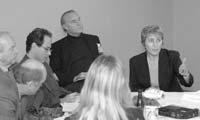| FOB
Briefs
Vol. 10, No. 1, December,
2003
Women
Waging Peace
FOB Leads Balkan Roundtable
Discussion
 |
 |
| Glenn Ruga, Ike Williams, and Vjosa
Dobruna at the Balkan roundtable during the Women Waging
Peace Policy Day in Cambridge. |
|
On
Friday, November 7, 2003, in Cambridge, Massachusetts, a group
of experts on the Balkans —including representatives
from the United Nations, the United States, nongovernmental
organizations, journalists, and foundations — gathered
for a roundtable discussion at the Women Waging Peace Policy
Day. Glenn Ruga, FOB’s director, facilitated the discussion.
Women Waging Peace (www.womenwaging peace.net) is a nonprofit
organization promoting innovative and inclusive approaches
to social change at local, national, and global levels. Its
Annual Policy Day, the culmination of the annual Women Waging
Peace colloquium, brings together participants in small roundtable
discussions on a wide range of issues. Among those participating
in the Balkans roundtable were Vjosa Dobruna, former minister
of democratization and former head of the Department for Democratic
Governance and Civil Society in Kosovo with the United Nations
Joint
Interim Administrative Structure; Edmund Beard, dean of the
John W. McCormack Graduate School of Policy Studies at the
University of Massachusetts, Boston; Nerissa J. Cook, director
of the Office of Policy and Global Issues in the US Department
of State’s Bureau of European and Eurasian Affairs;
and Slavica Indzevksa-Stojanovic, deputy executive director
for joint programs of the Open Society Institute in Skopje,
Macedonia.
The discussion covered much ground, but the participants agreed
on several points, one of the most important being that the
region must embrace the concept of “Unity in Diversity,”
as articulated by well-known Bosnian philosopher Rusmir Mahmutcehajic.
Unfortunately, several barriers to this unity remain, including
the realities that people in the Balkans continue to be locked
in history, traditional roles, and hatred; and that distrust
on all levels — among different ethnic groups and between
citizens groups and the government, as well as distrust in
the pillars of power — remains widespread.
Participants noted that one necessary step in addressing these
problems is to provide a forum for discussion of the difficult
and tragic periods in the region’s history, rather than
avoiding them and acting as if they never happened. An honest,
open, and equitable process for rebuilding civil society is
imperative. Hopeful signs include growing cross-border cooperation,
particularly among women’s groups, and the establishment
of a Center for Women Leadership in Pristina, Kosovo.
Ultimately, the participants agreed, if one takes the long
view, there is always hope. Progress is being made, and enough
people care about and are engaged in creating change and waging
peace that eventually —and maybe sooner rather than
later — it will happen.
|

















